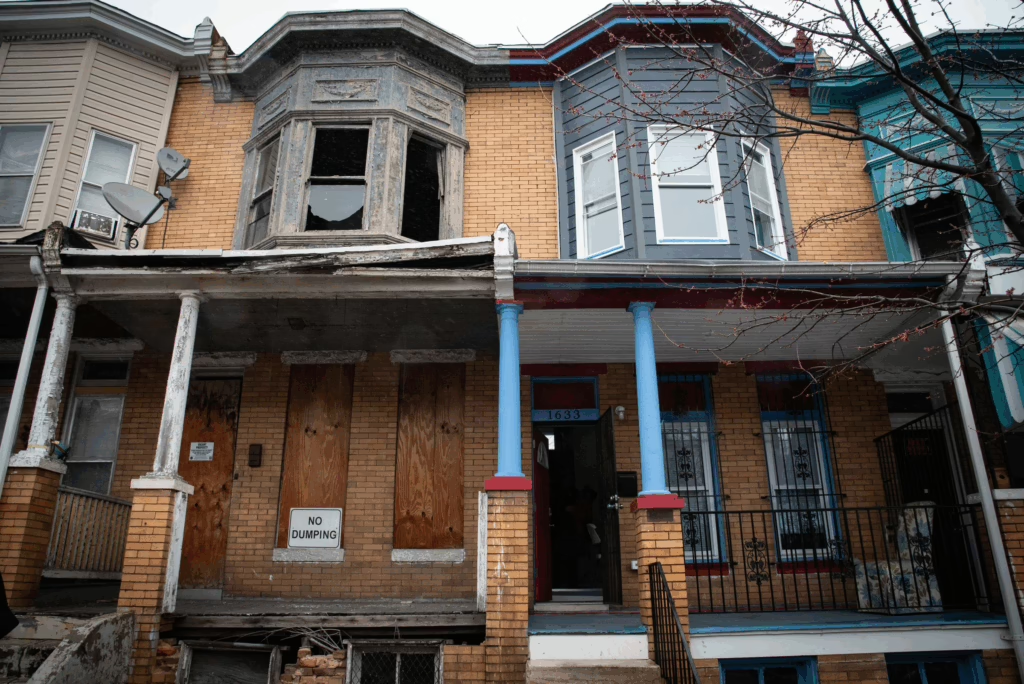
Waterbottle Cooperative: Repairing communities, rebuilding lives
Normally, houses have roofs. Floors tend to not end abruptly in mid-air. And usually complete walls are in place to keep the elements at bay.
Not in West Baltimore, though. Here, decades of disinvestment have led to a crisis of abandonment—the historically Black community stripped of the resources it deserves and the built environment—block upon block of two and three story brick and stone rowhomes—left to crumble and decay. At 1808 Appleton Street, that means that a light mist is drifting down from a hole in the ceiling through a missing half of a second floor, and onto Erik Gates, a worker-owner at Appalachian Field Services (AFS), who is passing new 2x4s up to his colleague Clyde Phillips standing on the story above.
Five years ago, Erik was looking for work—and not having much luck, because of the impacts of incarceration that linger long after a return to “freedom.” But then he met Clyde, a master builder working with AFS, and found he had a chance to turn his life around. Today, he’s not only working to rebuild the devastated neighborhoods of West Baltimore, house by house, but he’s doing so as the co-owner of a democratic workplace, designed from the ground up around second chances.
Waterbottle/AFS in the news…
The Guardian: They went from rehab and jail to owning a real estate portfolio: ‘You own the hell out of this house!’
The Baltimore Banner: A worker-owned co-op is giving Baltimore’s vacant homes — and people — a second chance
Impact Alpha: Real Revitalization: Worker co-op turns distressed homes in West Baltimore into affordable housing and shared equity
AFS was formed in 2010 as a “social enterprise” of sorts. David Lidz didn’t know that term, but he knew that he needed to run the business he had found himself in charge of differently. This was a second chance he was lucky to have, after his previous life had fallen apart at 36 years old when an alcoholic addiction caused him to hit rock bottom, or maybe even a little lower. His former career in government relations destroyed, he had gotten sober and clawed his way back on his feet working the only job he could find—doing odds and ends construction and maintenance work for property managers, sometimes minor repairs or mowing lawns, but mostly cleaning up after evictions, and boarding up vacants—the bottom of the real estate food chain. He was good at the work, though, so he wound up scraping together enough for a van and a handful of tools of his own, going from day laborer to independent contractor.
But it wasn’t just work he was after, and that’s where the origin story for AFS starts. For David, recovery meant committing himself to a life lived in commitment to values: service, accountability, honesty, and integrity. As the work started to grow and he began to hire people who, like him, had struggled with addiction and needed a second chance, it turned out these values were also pretty good ones to base a business on. Appalachian Field Services became a life-line for the people David brought in to work with him, and he started thinking bigger. Most of the jobs the company was getting tended to be about managing, or even abetting, the decay of the neighborhoods they were working in, helping absentee property owners warehouse the properties they were speculating on. What if AFS could work against this trend, and start buying these vacant properties themselves, renovating them and turning them into a place for people in the community to live?
Doing this was going to take more capital than a crew of laborers could scrape up. But banks and mainstream community development organizations weren’t interested—for the former, the risk was too great, and for the latter, the piecemeal, house-by-house scale of the revitalization AFS wanted to do didn’t fit the usual model for redevelopment financing. That’s where BRED came in, making an initial $495,000 loan in 2020, drawing on the non-extractive capital made available through membership in Seed Commons. This funding facilitated the conversion of AFS to worker-ownership, and gave it the working capital it needed to test its new model out, renovating three properties acquired in the Park Circle neighborhood of West Baltimore. Once renovated, these properties would be held and rented out by a new property management company Rising—which together with AFS itself would now be owned by WaterBottle, a cooperative holding company established to put workers from both sides of the business in charge through democratic ownership.

David Lidz, founder of AFS, looks out over West Baltimore. [Photo: Casey McKeel]
Today, looking off of a tiny third story balcony over West Baltimore’s Sandtown-Winchester neighborhood, David’s enthusiasm for this work is contagious. This is the neighborhood where Freddie Gray lived and died, killed by the Baltimore Police Department in 2015. After the Uprising, a lot of noise was made about helping this neighborhood recover from decades of disinvestment, but by and large not much has changed—this block of stately three story brick townhomes along North Avenue, the major East-West boulevard through the neighborhood, is almost entirely vacant. The building next door has been abandoned for so long that a two foot thick tree trunk has grown up in the exact shape of a door frame.
And the vultures are circling. David says that a lot of the properties in the neighborhood are being snatched up at auction by big private equity portfolios, waiting for the payoff of speculative profit. AFS and Rising are doing something different—they are renovating the properties they acquire for immediate use, renting them out to tenants, and keeping the money circulating in the community through their worker-owned structure. They are hoping to figure out a way to share some of this neighborhood equity with the people living in the properties they renovate—although figuring out what makes sense for scattered site, single-family home rentals has proved more challenging than they initially thought it would be.
The building we’re in now is the largest acquisition to date—much bigger than most of the modest two story homes lining the smaller streets in West Baltimore. So AFS and Rising are doing something a little different with this one. The top floor is going to be dormitory-style housing for some of the homeless youth they’ve gotten to know through a local job training program—David tells me how the kids come to learn construction skills on the job with AFS, but don’t have anywhere safe to go when they leave. So the cooperative is going to try and fix that, a half a dozen kids at a time. Part of the building will be offices for AFS and a community meeting room. The entire ground floor, including an adjacent storefront garage, is slated to become half woodworking workshop and half showroom—the idea is to take all the incredible old wood that they are constantly pulling out of collapsing buildings, divert it from the landfill, and upcycle it into furniture.

A decaying vacant, left, next to a renovated AFS house on the right. [Photo: Casey McKeel]
David’s particularly excited about the way they are beginning to layer ecological action into the fundamentals of their cooperative business—something he says would not have been possible without the support of Seed Commons. The wood reclamation is just a piece of this. Already, every house they redo is converted to run entirely on electricity, although David is quick to admit that while this is great from the standpoint of a green transition, it also means the crew gets to avoid dealing with ancient gas lines and additional overhead from the sclerotic local utility company. As the climate in Baltimore gets warmer and wetter, the stormwater runoff that already overloads the city’s aging infrastructure is becoming more and more of an issue—and so AFS is now integrating green stormwater management into their renovations, working to divert and absorb rainwater before it hits the storm drains.
All of this—the growing company and the second chances its giving its worker-owners, the reconstruction of vacants into housing, the grassroots ecological action—would have been absolutely impossible without a local cooperative ecosystem capable of bringing real financial capacity to the table.
All of this—the growing company and the second chances its giving its worker-owners, the reconstruction of vacants into housing, the grassroots ecological action—would have, David emphasizes, been absolutely impossible without a local cooperative ecosystem capable of bringing real financial capacity to the table. If we want to understand the success of AFS and Rising, we need to understand that ecosystem, and how BRED built it…
